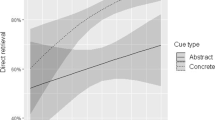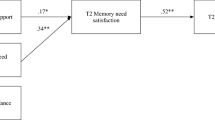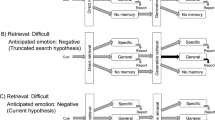Abstract
The present investigation examined whether autobiographical memory can function to regulate competence need satisfaction. Across two experiments, we examined how autobiographical memories affected perceived competence after competence was threatened or satisfied in a previous task. Experiment 1 results from an undergraduate student sample (N = 150) indicated that reflecting on a competence-satisfying memory increased perceived competence for all participants, but this increase was particularly large for participants whose competence was previously threatened. Experiment 2 results using an undergraduate student sample (N = 245) indicated that participants were not more likely to select a competence-satisfying autobiographical memory over a relatedness-satisfying memory after experiencing a competence threat in a previous task; however, those who selected a competence-satisfying memory reported greater competence need satisfaction and more positive affect than those who selected a relatedness-satisfying memory. Moreover, degree of competence need satisfaction predicted positive affect which in turn predicted self-esteem and optimism. The present experiments highlight the powerful role of reflecting on important autobiographical experiences on need fulfillment and general psychological well-being.


Similar content being viewed by others
Notes
Positive and negative affect were also measured in this study. Results related to these variables are reported in the supplemental materials.
Vansteenkiste and Ryan (2013) indicate that need satisfaction may operate independently from need frustration. To examine this possibility in the present experiments, we also created two subscales for each need, one subscale with need satisfaction items (e.g., I feel capable at what I do) and one subscale with need frustration items (e.g., I feel like a failure because of the mistakes I make). In the present experiment, results did not vary by subscale so results are combined into a composite measure to simplify presentation of results. Analyses of separate subscales can be found in the supplemental materials.
Bauer & McAdams (2000) argue that autonomy is less often represented in a single, episodic event in autobiographical memory than in the desire to integrate the various aspects of one’s experiences into a coherent whole. Although we believe that individuals likely do hold clear episodic memories centered on personal autonomy, we did not include autonomy as a memory prompt in this study to increase the ease with which specific events could be recalled by participants in this study.
Due to space constraints, presentation of results pertaining to relatedness and autonomy are provided in the supplemental analyses document. As in Experiment 1, results indicated a general increase on relatedness and autonomy over time, a pattern that did not interact with task condition.
Given research on gender and memory themes (Boytos et al. 2020), analyses related to competence need satisfaction and positive affect were also conducted with gender entered as a covariate. Results indicated that the inclusion of gender did not meaningfully change observed effects. Analyses related to relatedness, autonomy, and need satisfaction and need frustration subscales are presented in supplemental materials. Subscale findings are similar to those reported here with the exception of the mediational analyses which found that need satisfaction, but not need frustration, mediated the association between memory and self-esteem and optimism.
Pairwise comparisons indicated that among participants who were assigned to the difficult RAT task, those who selected competence memories had similar correctness scores on the RAT (M = .44, SD = .79) as those who selected relationship memories (M = .71, SD = .86), F(1, 231) = 1.06, p = .305, ηp2 = .005.
References
Abele, A. E., & Wojciszke, B. (2007). Agency and communion from the perspective of self versus others. J Personality Soc Psychol, 93(5), 751–763. https://doi.org/10.1037/0022-3514.93.5.751
Alea, N., & Wang, Q. (2015). Going global: the functions of autobiographical memory in cultural context. Memory, 23(1), 1–10. https://doi.org/10.1080/09658211.2014.972416
Aronson, J., Blanton, H., & Cooper, J. (1995). From dissonance to disidentification: selectivity in the self-affirmation process. J Personality Soc Psychol, 68(6), 986–996. https://doi.org/10.1037/0022-3514.68.6.986
Austin, A., & Costabile, K. (2017). Two routes toward optimism: how agentic and communal themes in autobiographical memories guide optimism for the future. Memory, 25(10), 1358–1365. https://doi.org/10.1080/09658211.2017.1305417
Bartholomew, K. J., Ntoumanis, N., Ryan, R. M., Bosch, J. A., & Thøgersen-Ntoumani, C. (2011). Self-determination theory and diminished functioning: The role of interpersonal control and psychological need thwarting. Personality Soc Psychol Bull, 37(11), 1459–1473. https://doi.org/10.1177/2F0146167211413125
Bauer, J. J., & McAdams, D. P. (2000). Competence, relatedness, and autonomy in life stories. Psychol Inquiry, 11(4), 276–279. http://www.jstor.org/stable/1449620
Bauer, J. J., & McAdams, D. P. (2004). Personal growth in adults’ stories of life transitions. J Personality, 72(3), 573–602. https://doi.org/10.1111/j.0022-3506.2004.00273.x
Bauer, J. J., McAdams, D. P., & Sakaeda, A. R. (2005). Interpreting the good life: growth memories in the lives of mature, happy people. J Personality Soc Psychol, 88(1), 203. https://doi.org/10.1037/0022-3514.88.1.203
Baumeister, R. F., & Leary, M. R. (1995). The need to belong: desire for interpersonal attachments as a fundamental human motivation. Psychol Bull, 117, 497–529.
Berntsen, D. (2018). The dynamics of episodic memory functions. Behav Brain Sci, 41, e4. https://doi.org/10.1017/S0140525X17001261
Bialobrzeska, O., Elliot, A. J., Wildschut, T., & Sedikides, C. (2019). Nostalgia counteracts the negative relation between threat appraisals and intrinsic motivation in an educational context. Learn Indiv Diff, 69, 219–224. https://doi.org/10.1016/j.lindif.2018.04.011
Bluck, S. (2003). Autobiographical memory: exploring its functions in everyday life. Memory, 11(2), 113–123. https://doi.org/10.1080/741938206
Bluck, S., & Alea, N. (2009). Characteristics of positive autobiographical memories in adulthood. Int J Aging Human Dev, 69(4), 247–265. https://doi.org/10.2190/2FAG.69.4.a
Bluck, S., Alea, N., Habermas, T., & Rubin, D. C. (2005). A tale of three functions: the self–reported uses of autobiographical memory. Social Cognition, 23(1), 91–117. https://doi.org/10.1521/soco.23.1.91.59198
Boytos, A. S., Costabile, K. A., Austin, A. B., & Short, K. A. (2020). Feminism, gender, and agentic and communal themes in narrative identity. Sex Roles, 83(1), 54–63. https://doi.org/10.1007/s11199-019-01089-x
Brannon, D. C. (2019). What makes people choose within-domain versus across-domain compensation following a self-threat? the role of self-verification motives. J Marketing Manag, 35(9–10), 940–964. https://doi.org/10.1080/0267257X.2019.1620840
Cappeliez, P., O’Rourke, N., & Chaudhury, H. (2005). Functions of reminiscence and mental health in later life. Aging Mental Health, 9(4), 295–301. https://doi.org/10.1080/13607860500131427
Chen, B., Vansteenkiste, M., Beyers, W., Boone, L., Deci, E. L., Van der Kaap-Deeder, J., et al. (2015). Basic psychological need satisfaction, need frustration, and need strength across four cultures. Motivation and Emotion, 39, 216–236. https://doi.org/10.1007/s11031-014-9450-1
Cheung, W. Y., Wildschut, T., Sedikides, C., Hepper, E. G., Arndt, J., & Vingerhoets, A. J. (2013). Back to the future: nostalgia increases optimism. Personality Soc Psychol Bull, 39(11), 1484–1496. https://doi.org/10.1177/2F0146167213499187
Conway, M. A. (2009). Episodic memories. Neuropsychologia, 47(11), 2305–2313. https://doi.org/10.1016/j.neuropsychologia.2009.02.003
Deci, E. L. (1975). Intrinsic motivation. New York: Plenum.
Deci, E., & Ryan, R. M. (1985). Intrinsic motivation and self-determination in human behavior. Springer Science & Business Media.
Deci, E. L., & Ryan, R. M. (2000). The ‘what’ and ‘why’ of goal pursuits: human needs and the self-determination of behaviour. Psychol Inquiry, 11, 319–338. https://doi.org/10.1207/S15327965PLI1104_01
Fang, H., He, B., Fu, H., & Meng, L. (2017). Being eager to prove oneself: U-shaped relationship between competence frustration and intrinsic motivation in another activity. Front Psychol, 8, 2123. https://doi.org/10.3389/fpsyg.2017.02123
Faul, F., Erdfelder, E., Lang, A. G., & Buchner, A. (2007). G* Power 3: a flexible statistical power analysis program for the social, behavioral, and biomedical sciences. Behav Res Method, 39(2), 175–191. https://doi.org/10.3758/BF03193146
Ferrand, C., Martinent, G., & Durmaz, N. (2014). Psychological need satisfaction and well-being in adults aged 80 years and older living in residential homes: using a self-determination theory perspective. J Aging Stud, 30, 104–111. https://doi.org/10.1016/j.jaging.2014.04.004
Hayes, A. F. (2013). Introduction to mediation, moderation, and conditional process analysis: a regression-based approach. New York: The Guilford Press.
Hayes, A. F., & Preacher, K. J. (2014). Statistical mediation analysis with a multicategorical independent variable. Brit J Math Statist Psychol, 67(3), 451–470. https://doi.org/10.1111/bmsp.12028
Hofer, J., Busch, H., Šolcová, I. P., & Tavel, P. (2017). When reminiscence is harmful: the relationship between self-negative reminiscence functions, need satisfaction, and depressive symptoms among elderly people from Cameroon, the Czech Republic, and Germany. J Happiness Stud, 18(2), 389–407. https://doi.org/10.1007/s10902-016-9731-3
Houle, I., & Philippe, F. L. (2017). Need satisfaction in episodic memories impacts mood at retrieval and well-being over time. Personality Indiv Diff, 105, 194–199. https://doi.org/10.1016/j.paid.2016.09.059
Knowles, M. L., Lucas, G. M., Molden, D. C., Gardner, W. L., & Dean, K. K. (2010). There’s no substitute for belonging: self-affirmation following social and nonsocial threats. Personality Soc Psychol Bull, 36(2), 173–186. https://doi.org/10.1177/2F0146167209346860
Kulkofsky, S., Wang, Q., & Koh, J. B. K. (2009). Functions of memory sharing and mother-child reminiscing behaviors: individual and cultural variations. J Cognit Dev, 10(1–2), 92–114. https://doi.org/10.1080/15248370903041231
Kunda, Z. (1990). The case for motivated reasoning. Psychol Bull, 108(3), 480–498. https://doi.org/10.1037/0033-2909.108.3.480
Kunda, Z., & Sanitioso, R. (1989). Motivated changes in the self-concept. J Expt Soc Psychol, 25(3), 272–285. https://doi.org/10.1016/0022-1031(89)90023-1
Lazarus, R., & Folkman, S. (1984). Stress, appraisal, and coping. New York: Springer.
Lekes, N., Guilbault, V., Philippe, F. L., & Houle, I. (2014). Remembering events related to close relationships, self-growth, and helping others: intrinsic autobiographical memories, need satisfaction, and well-being. J Res Personality, 53, 103–111. https://doi.org/10.1016/j.jrp.2014.09.002
Linville, P. W. (1985). Self-complexity and affective extremity: don’t put all of your eggs in one cognitive basket. Soc Cognit, 3(1), 94–120. https://doi.org/10.1521/soco.1985.3.1.94
Maki, Y., Kawasaki, Y., Demiray, B., & Janssen, S. M. (2015). Autobiographical memory functions in young Japanese men and women. Memory, 23(1), 11–24. https://doi.org/10.1080/09658211.2014.930153
Mandel, N., Rucker, D. D., Levav, J., & Galinsky, A. D. (2017). The compensatory consumer behavior model: how self-discrepancies drive consumer behavior. J Consumer Psychol, 27(1), 133–146. https://doi.org/10.1016/j.jcps.2016.05.003
Marsh, H. W., Martin, A. J., Yeung, A. S., & Craven, R. G. (2017). Competence self-perceptions. In A. J. Elliot, C. S. Dweck, & D. S. Yeager (Eds.), Handbook of competence and motivation: Theory and application (p 85–115). The Guilford Press.
McAdams, D. P., Hoffman, B. J., Mansfield, E. D., & Day, R. (1996). Themes of agency and communion in significant autobiographical scenes. J Personality, 64, 339–377. https://doi.org/10.1111/j.1467-6494.1996.tb00514.x
McAdams, D. P., & Olson, B. D. (2010). Personality development: continuity and change over the life course. Ann Rev Psychol, 61, 517–542. https://doi.org/10.1146/annurev.psych.093008.100507
McFarlin, D. B., & Blascovich, J. (1984). On the Remote Associates Test (RAT) as an alternative to illusory performance feedback: a methodological note. Basic Appl Soc Psychol, 5(3), 223–229. https://doi.org/10.1207/s15324834basp0503_5
Milyavskaya, M., Gingras, I., Mageau, G. A., Koestner, R., Gagnon, H., Fang, J., & Boiché, J. (2009). Balance across contexts: importance of balanced need satisfaction across various life domains. Personality Soc Psychol Bull, 35(8), 1031–1045. https://doi.org/10.1177/2F0146167209337036
Ntoumanis, N., Edmunds, J., & Duda, J. L. (2009). Understanding the coping process from a self-determination theory perspective. Brit J Health Psychol, 14(2), 249–260. https://doi.org/10.1348/135910708X349352
Öner, S., & Gülgöz, S. (2018). Autobiographical remembering regulates emotions: a functional perspective. Memory, 26(1), 15–28. https://doi.org/10.1080/09658211.2017.1316510
O’Rourke, N., Cappeliez, P., & Claxton, A. (2011). Functions of reminiscence and the psychological well-being of young-old and older adults over time. Aging Mental Health, 15(2), 272–281. https://doi.org/10.1080/13607861003713281
Parker, R. G. (1999). Reminiscence as continuity: comparison of young and older adults. J Clin Geropsychol, 5(2), 147–157. https://doi.org/10.1023/A:1022931111622
Pennebaker, J. W., Boyd, R. L., Jordan, K., & Blackburn, K. (2015). The development and psychometric properties of LIWC2015. Austin, TX: University of Texas at Austin.
Philippe, F. L., & Bernard-Desrosiers, L. (2017). The odyssey of episodic memories: identifying the paths and processes through which they contribute to well-being. J Personality, 85(4), 518–529. https://doi.org/10.1111/jopy.12257
Philippe, F. L., Koestner, R., Beaulieu-Pelletier, G., & Lecours, S. (2011). The role of need satisfaction as a distinct and basic psychological component of autobiographical memories: a look at well-being. J Personality, 79(5), 905–938. https://doi.org/10.1111/j.1467-6494.2010.00710.x
Philippe, F. L., Koestner, R., Beaulieu-Pelletier, G., Lecours, S., & Lekes, N. (2012). The role of episodic memories in current and future well-being. Personality Soc Psychol Bull, 38(4), 505–519. https://doi.org/10.1177/0146167211429805
Pillemer, D. B., Ivcevic, Z., Gooze, R. A., & Collins, K. A. (2007). Self-esteem memories: Feeling good about achievement success, feeling bad about relationship distress. Personality and Social Psychology Bulletin, 33, 1292–1305. https://doi.org/10.1177/2F0146167207303952
Qualtrics, L. L. C. (2018). Qualtrics [software]. Utah, USA: Qualtrics.
Radel, R., Pelletier, L., & Sarrazin, P. (2013). Restoration processes after need thwarting: when autonomy depends on competence. Motivation Emotion, 37, 234–244. https://doi.org/10.1007/s11031-012-9308-3
Ryan, R. M. (1995). Psychological needs and the facilitation of integrative processes. J Personality, 63(3), 397–427. https://doi.org/10.1111/j.1467-6494.1995.tb00501.x
Ryan RM and Deci EL (2008) Self-dtermination theory and the role of basic psychological needs in personality and the organization of behavior. In O. P. John, R. W. Robins, & L. A. Pervin (Eds.), Handbook of personality: theory and research (p 654–678). The Guilford Press.
Ryff, C. D. (1995). Psychological well-being in adult life. Curr Directions Psychol Sci, 4(4), 99–104. https://doi.org/10.1111/2F1467-8721.ep10772395
Sanitioso, R., Kunda, Z., & Fong, G. T. (1990). Motivated recruitment of autobiographical memories. J Personality Soc Psychol, 59(2), 229–241. https://doi.org/10.1037/0022-3514.59.2.229
Schüler, J., Sheldon, K. M., & Fröhlich, S. M. (2010). Implicit need for achievement moderates the relationship between competence need satisfaction and subsequent motivation. J Res Personality, 44(1), 1–12. https://doi.org/10.1016/j.jrp.2009.09.002
Sheldon, K. M., Elliot, A. J., Kim, Y., & Kasser, T. (2001). What is satisfying about satisfying events? testing 10 candidate psychological needs. J Personality Soc Psychol, 80(2), 325. https://doi.org/10.1037/0022-3514.80.2.325
Sheldon, K. M., & Gunz, A. (2009). Psychological needs as basic motives, not just experiential requirements. J Personality, 77(5), 1467–1492. https://doi.org/10.1111/j.1467-6494.2009.00589.x
Speelman, C. P., & Shadbolt, E. (2018). The role of awareness of repetition during the development of automaticity in a dot-counting task. PeerJ, 6, e4329. https://doi.org/10.7717/peerj.4329
Strack, F., & Deutsch, R. (2004). Reflective and impulsive determinants of social behavior. Personality Soc Psychol Rev, 8(3), 220–247. https://doi.org/10.1207/2Fs15327957pspr0803_1
Thompson, T. (1993). Remote associate problem sets in performance feedback paradigms. Personality Individual Diff, 14(1), 11–14. https://doi.org/10.1016/0191-8869(93)90169-4
Van den Broeck, A., Ferris, D. L., Chang, C. H., & Rosen, C. C. (2016). A review of self-determination theory’s basic psychological needs at work. J Manag, 42(5), 1195–1229. https://doi.org/10.1177/2F0149206316632058
Vansteenkiste, M., & Ryan, R. M. (2013). On psychological growth and vulnerability: basic psychological need satisfaction and need frustration as a unifying principle. J Psychother Integr, 23(3), 263. https://doi.org/10.1037/a0032359
Vess, M., Arndt, J., Routledge, C., Sedikides, C., & Wildschut, T. (2012). Nostalgia as a resource for the self. Self Identity, 11(3), 273–284. https://doi.org/10.1080/15298868.2010.521452
Wang, D., Chatzisarantis, N. L., & Hagger, M. S. (2018). Why distractors with need-supportive content can mitigate ironic effects of thought suppression. Motivation Emotion, 42(2), 214–224. https://doi.org/10.1007/s11031-017-9653-3
Wang, Q., Koh, J. B. K., Song, Q., & Hou, Y. (2015). Knowledge of memory functions in European and Asian American adults and children: the relation to autobiographical memory. Memory, 23(1), 25–38. https://doi.org/10.1080/09658211.2014.930495
Waterschoot, J., van der Kaap-Deeder, J., & Vansteenkiste, M. (2020). The role of competence-related attentional bias and resilience in restoring thwarted feelings of competence. Motivation Emotion, 44(1), 82–98. https://doi.org/10.1007/s11031-019-09776-8
Watson, D., Clark, L. A., & Tellegen, A. (1988). Development and validation of brief measures of positive and negative affect: the PANAS scales. J Personality Soc Psychol, 54(6), 1063.
Webster, J. D. (1995). Adult age differences in reminiscence functions. In B. K. Haight & J. D. Webster (Eds.), The art and science of reminiscing: theory, research, methods, and applications. Washington, DC: Taylor and Francis.
White, R. W. (1959). Motivation reconsidered: the concept of competence. Psychol Rev, 66(5), 297. https://doi.org/10.1037/h0040934
Wojciszke, B. (2005). Morality and competence in person-and self-perception. Eur Rev Soc Psychol, 16(1), 155–188. https://doi.org/10.1080/10463280500229619
Wojciszke, B., & Sobiczewska, P. (2013). Memory and self-esteem. Soc Psychol, 44(2), 95–102. https://doi.org/10.1027/1864-9335/a000149
Funding
No funding was received to assist with the preparation of this manuscript.
Author information
Authors and Affiliations
Contributions
All authors contributed to the study conception and design. Material preparation and data collection were performed by AA. Data analysis was performed by AA and KC. This manuscript is based on the dissertation written by AA. All authors contributed to, read, and approved the final manuscript.
Corresponding author
Ethics declarations
Conflict of interest
The authors have no relevant financial or non-financial interests to disclose.
Ethical approval
Approval was obtained from the ethics committee of Iowa State University. The procedures in this study adhere to the tenets of Helsinki.
Consent to participate
Informed consent was obtained from all individual participants included in the study.
Additional information
Publisher's Note
Springer Nature remains neutral with regard to jurisdictional claims in published maps and institutional affiliations.
Rights and permissions
About this article
Cite this article
Austin, A.B., Costabile, K.A. The role of autobiographical memory in competence need satisfaction. Motiv Emot 45, 456–472 (2021). https://doi.org/10.1007/s11031-021-09895-1
Accepted:
Published:
Issue Date:
DOI: https://doi.org/10.1007/s11031-021-09895-1




